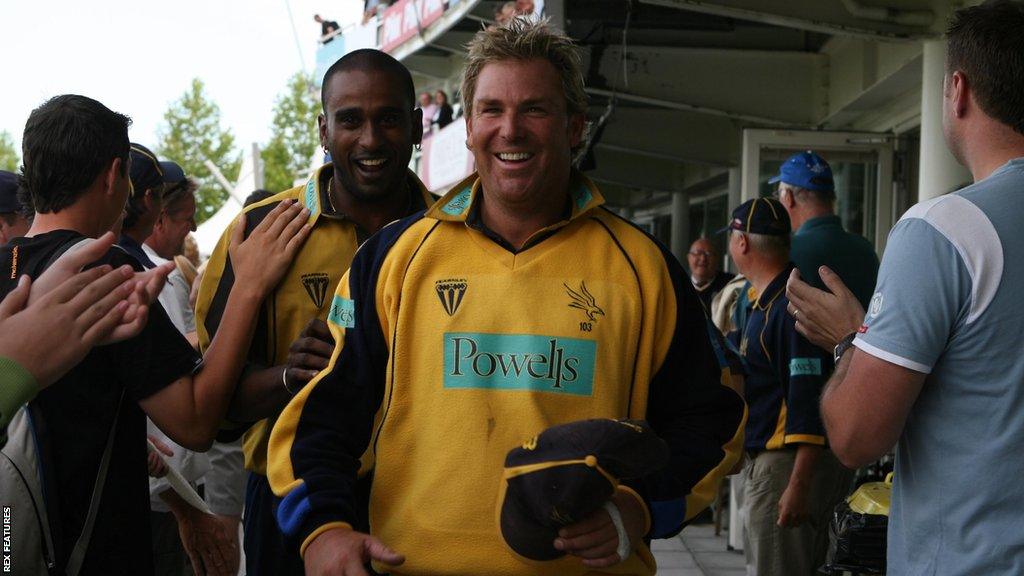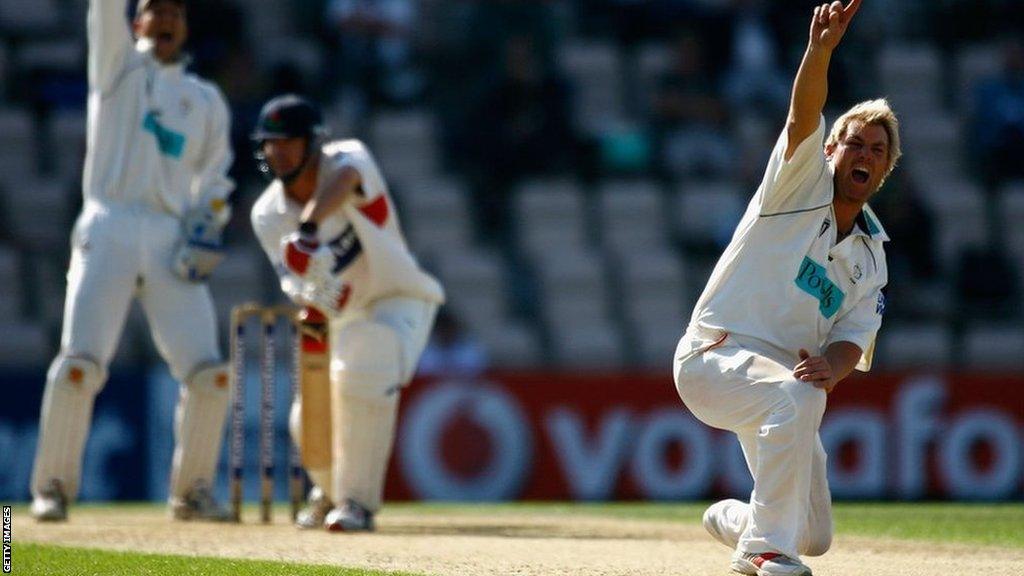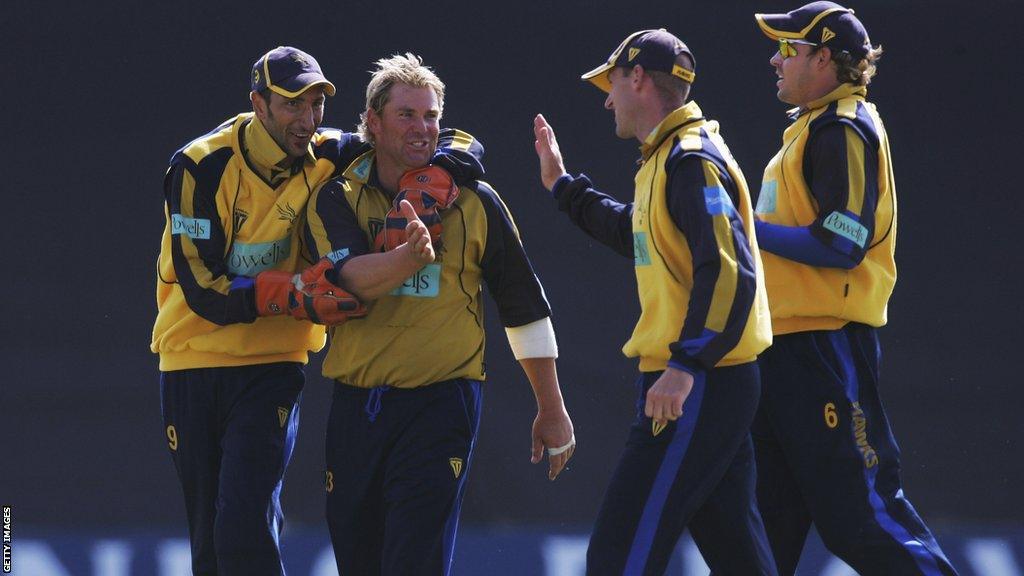Shane Warne: How the late Australia cricket legend transformed Hampshire
- Published

Shane Warne is credited with transforming Hampshire, and captained the club between 2004 and 2007
When Hampshire signed Shane Warne in 1999, for his first taste of English domestic cricket, it was the biggest signing in the club's history.
They were battling away in the County Championship and had not won anything for more than a decade - they were described in cricket circles as 'Happy Hampshire'.
That did not deter them from an audacious bid to sign the Australia leg-spinner, who had arguably been the world's most dominant bowler of the decade and just led his country to World Cup glory.
A year on from Warne's tragic death journalist Robbie James has dedicated an audio documentary to one of the greatest cricketers of all time, and reflects on how he transformed Hampshire over his seven-year affiliation with the club.
Showdown at Her Majesty's Palace
When Warne arrived at the south coast club in 2000 it is safe to say it was not the top-flight sports team it is now.
"We were bumbling along having some good days and having some bad days," former Hants chairman Brian Ford told BBC Radio Solent's Shane Warne: A Hampshire love story documentary.
"The team needed a lot doing to it but we didn't have much money - we were doing what we could with what we had."
Hampshire did have England batter Robin Smith, nicknamed 'The Judge', who was friendly with Warne and knew he was interested in coming to play in England.
In 1999 - with 30-year-old Warne having taken 300 Test wickets and more than 200 in one-day internationals - the club board made contact with his agents to thrash out a deal.
But talks stalled.
"We couldn't talk to Shane himself who directed us back to his agents and we thought we were in danger of losing him," Ford added.
So in a last-ditch attempt to get Warne's signature and break the deadlock, he decided to corner the global star at a cricket reception - inside Buckingham Palace.
"I'd never met Shane Warne but I found him at the reception and there was a moment where he wasn't deep in conversation," Ford said.
"So I put my arm around his neck and said 'you don't know me' but 'are you going to come and play for Hampshire or not?'.
"He said 'why what is the problem? I would love to'.
"I asked him to sort his agents out because we were getting absolutely nowhere."
"He said 'leave it to me' and I when I arrived home the next day I got a phone call from the club saying 'what did you say to Warne at the Palace?'
"I was worried and said 'why, is there a problem?'
"They said 'no far from it - we seem to be all systems go'."
A rock star who changed Hampshire

Hampshire struggled in Warne's first spell but he transformed them when he returned as captain and his influence is still felt at the Ageas Bowl
Warne finally joined Hampshire in 2000 on a short one-season deal.
But the club struggled and ended up getting relegated.
When he left, the county had a total overhaul and new owners built a new ground - what is now the Ageas Bowl.
They then brought Warne back in 2003 as the team's captain, but before he could take to the pitch he was banned for 12 months following a positive drugs test.
He would return in 2004 to honour his contract and go on to change Hampshire cricket forever.
"We were one of those shire counties that didn't win competitions too often," said Hampshire cricket historian Dave Allen.
"In 1992 we won a cup final at Lord's [Benson & Hedges Cup] but then we didn't win anything for 13 years.
"Then Warne arrives as our captain for two years and we earn promotion, finish runners-up in the Championship and won a Lord's final."
Remarkably, Warne did not even play in that final - against Warwickshire in the Cheltenham & Gloucester Trophy - because of his involvement in that summer's memorable Ashes series, but stand-in captain Shaun Udal said the county getting to that position was "down to him"., external
Warne's never say die attitude 'embedded' at Hampshire

Warne's final season at the Rose Bowl was in 2007
Warne flourished as Hampshire's captain and their fortunes on the field improved.
After leading the team to promotion in 2004, they finished second in the County Championship in 2005 and third in 2006, when Warne claimed 58 wickets.
His former team-mates remember him fondly as a kind and supportive leader who went out of his way to give team-mates opportunities.
"Warne looked after me incredibly well and took me under his wing on the Australia team and he is the reason I came to Hampshire," said former Australia and Hampshire all-rounder Shane Watson.
"He was so generous with his time and advice. Just his presence helped us all a lot and he made us all better.
"He would say 'if things aren't going your way just find a way, ugly hundreds are the best hundreds'."
Hampshire chairman Rod Bransgrove, who signed Warne the second time around, said the Aussie bowler made the club relevant.
"We became far more competitive and that lasts today," he said.
"Warne left a legacy of never giving up. It was one of his phrases, 'never give up, ever'.
"He would say 'effort is never an option it is free and expected of everyone'.
"These kind of things are embedded in the clubs philosophy now."
Warne retired in 2007 after claiming a further 50 wickets as Hampshire finished fifth.
Over his 15-year international career he took 708 Test wickets - the second most of all time - in 145 matches, won seven Ashes series, one 50-over World Cup and bowled one 'ball of the century'.
The journey behind 'Shane Warne: A Hampshire Love Story'
Journalist James, from Hampshire, made the audio documentary for BBC Radio Solent to not only mark a year since the cricket great's death, but to share how Warne helped him reconnect with his dad following his parents' separation.
"Unfortunately, I haven't been able to have my dad as part of my life for quite a long time," said James.
"Shane Warne is someone who I attach very happy memories of my dad to because when I met Shane for the first time, it was when I had a really good relationship with my dad.
"Warne was brilliant at bringing people together and he weirdly did that when he died, with me and my dad.
"Putting this [documentary] together, over the course of the year, has been so personal, but also I feel like I owe it to him."